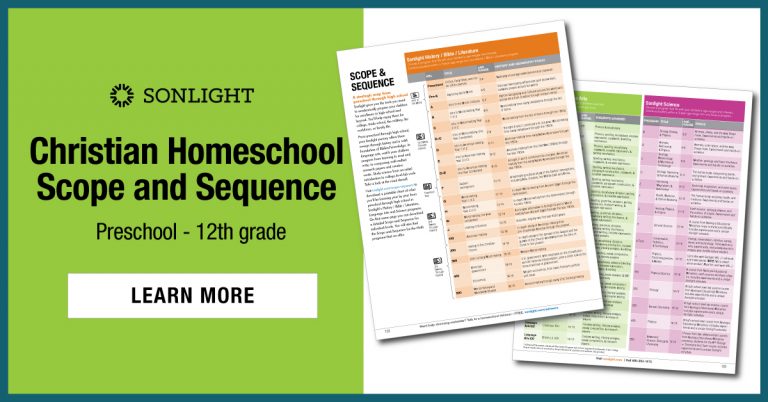
Your child is an advanced reader or otherwise shows being far beyond grade level. Wonderful, right? Because you homeschool, you can zoom that child ahead a grade or two, skipping the grades where your child has already mastered the material!
Wait a minute. There are considerations to weigh first! There are actually a few good reasons not to advance your child to a higher level as soon as you see signs of advanced growth.
1. Child Development is Not a Continuous Gradual Increase
Just as children have growth spurts in their physical bodies, their academic progress also grows in leaps and bounds during certain periods. Their ability might make great strides one year and be almost indiscernible the next. Sometimes they seem to develop skills overnight, and other times, you might find yourself frustrated that after several weeks they aren’t progressing at all. This kind of stop-and-start progress is normal!
Many children enter kindergarten a bit advanced. But being ahead in kindergarten isn’t a guarantee they will remain ahead in third, fifth, or even eighth grade. The reasons for this discrepancy are varied, but one main reason is that grade levels are arbitrary.
In kindergarten, it’s easy to see who knows their shapes, and who doesn’t; who can read words and who can’t. But as children mature, the differences between grade level blur. Consider these questions:
- What’s the difference between a fifth grade reading level and a sixth grade one?
- What’s the difference between ninth grade history and tenth grade history levels besides the fact they might cover different time periods?
As the levels increase, the abilities begin to blend together, too. A child who once was obviously ahead now is exactly on track.
2. Children Have Interests Besides Academics
As children mature, they invest more time in pastimes, hobbies, and extracurricular pursuits. Sports, activities, games, clubs, friends, music, and art demand more attention. When you move a child ahead a grade into more challenging academics, there's less margin for these extra—but oh so essential—activities.
3. Some Children Have Later Delays
Being advanced at an early age doesn't guarantee that same rate of development. For example, it’s not unusual for a child to be reading ahead in kindergarten, but discover they have dyslexia in third grade that stalls progress for a few years.
4. Emotional Maturity Does Not Always Parallel Intellectual Ability
Just because my 3-year-old could read and could tell me repeat back math sums didn’t mean she was ready to deal older children in a classroom or play advanced sports with them. Looking back, she wouldn’t have been ready to stand up and assert herself in a busy classroom.
Some common ways in which academically advanced children are less mature than older children doing the same work are:
- concentration level
- attention span
- willingness to sit still for long periods
5. Early Graduation Brings Its Own Challenges
When a child starts early and moves ahead quickly, high school graduation may fall at a very young age. While early graduation may sound like a pro, consider some of the challenges inherent in this situation.
Consider possible disadvantages a 15-year-old entering college may experience:
- They are unable to drive alone in most states, and will need to have a licensed driver in the car with them.
- They might not be emotionally ready for dorm life, college dating, or parties.
- Their lack of maturity may make them more susceptible to peer pressure, depression, and underage drinking as a result of feeling they don’t fit in.
While these circumstances certainly don’t affect all children, and there are ways to support your child so they don’t suffer from these negatives, finishing early isn’t always a positive.
Another big con to graduating early is not qualifying for dual enrollment. In my state, high school students can apply for dual enrollment, and the state pays their college tuition, including a certain number and type of classes, books, and most fees. My child can earn an AA degree before finishing school, without paying for it. However, once he graduates from high school, regardless of what age he is, the program stops. He must now apply for loans and grants, and pay out-of-pocket (or, out of my pocket) as a college student.
The Solution: Going Without Grade Levels
So what do you do when your child is advanced? The key is to simply choose curriculum for each subject that suits their ability and interest and don't worry about the labels of grade levels at all!
I no longer really pay attention to grade levels. Each of my six children is studying each subject at a level that best fits where they are in life with no regard to their age or grade level. If they need extra help in spelling, we spend more time on spelling. If we breeze through math books, we start the next one.
When I do need grade levels for some reason—outside sports, for example, I simply use the lowest grade level they would be called in public school, unless that grade level would not be appropriate. For example, my son took a class he was very knowledgeable in but that wasn’t offered to his grade level, so I enrolled him as the lowest grade level they offered the class to.
I’ve found over time it is easier to bump a child up a grade level, if need be, than to tell an older child they suddenly need to be held back because you advanced them too quickly. Instead of bothering too much with what grade level your child is, instead ask what level in each individual subject they are can comfortably to the schoolwork. Then select curriculum to match that level!
See what skills and topics are taught at each level of Sonlight in these Scope & Sequence charts. The create a customized education that fits your child's unique combination of levels.









